- Home
- Darrell Maloney
The Army Comes Calling Page 4
The Army Comes Calling Read online
Page 4
John was surprised to see the colonel soften a bit. It was obvious that he was used to getting his way. But he was also a man who accepted that things couldn’t always be solved by force alone. Sometimes wheeling and dealing was necessary.
“We will abide by your demands. The government, believe it or not, is trying to play it straight this time. We want to win the trust back that the American people haven’t had in the government for many years now. We want to go back to being by the people for the people.”
“Which is why you came in and demanded our livestock to begin with?”
“Touché, Mr. Jacoby. We took a firm stance because we assumed you wouldn’t be willing to share.”
“We’ve always been willing to share. All you had to do was ask.”
The four men shook hands, and the colonel reboarded the helicopter. The major said a few words to the driver of the lead vehicle, who restarted his truck and used the open area to turn around. One by one, the other drivers followed his lead, and within four minutes all of them were on their way back to the highway.
As John and Frank watched the helicopter lift off again and head south, Frank asked his friend, “You don’t trust them, do you?”
“Oh, hell no. I’ve lived for sixty two years without trusting the federal government. I’m too old to start now. We need to remain on full alert and put spotters in the woods, just to be safe.”
Chapter 8
It had once been the jewel of the Air Force Logistics Command, and one of the largest military bases in the world. Huge C-5 cargo planes, each one almost as long as a football field and higher than a six story building, once thundered down its runways.
In its last years, after the Air Force was forced to reduce its size due to budget constraints, Kelly Air Force Base, in south San Antonio, was forced to close its gates for good. The airplanes were transferred to other Air Force bases, and the old base threatened to become a blight on the city.
But the city of San Antonio stepped up and took over the place. Mammoth hangers became warehouses for civilian firms, and buildings were renovated and reused for a variety of other purposes.
The area was renamed The Port of San Antonio and became one of the most successful industrial areas in south Texas. It was a shining example of how a city could absorb a former military base and make it its own.
But that was before a meteorite named Saris 7 collided with the earth and destroyed most of mankind.
Now the former base had returned to its roots, seized by the federal government once again.
Oh, it started out with the best of intentions. At first it was a forward operating base for the Federal Emergency Management Agency. FEMA made it its mission to find the survivors in the San Antonio area and to help them as much as they could. They distributed stockpiled seeds and showed survivors how to plant crops to sustain themselves and their families.
It was the best FEMA could do in a world which no longer had an industrial base. It no longer had manufacturing plants or corporate farms, or ways to distribute food on a large scale.
Before FEMA stepped in, the area had become one pockmarked with small farming operations, family affairs, really, which grew enough crops to keep a handful of people alive and not much more.
The seeds and the training were a godsend to survivors who’d been through so much already, and were desperate to eke out a meager existence to get past the worst disaster ever known to man.
Once FEMA deemed its work done, it moved on.
“Continue to grow your crops,” they told the residents of San Antonio. “Share your seeds with others, so they can grow their own crops. It’s by working together and sharing what we have that we can help each other get through this.”
FEMA left the area, turning the former base over to the Army, which had no real mission other than to do what it could to pick up where FEMA left off.
In a world where most of the people had died but where chaos lived on, a commanding general named Baker was suddenly in charge.
Lieutenant General Lawrence T. Baker wore his three stars with great pride. He’d earned his mettle in three wars, having seen the dying days of Vietnam as a wet-eared lieutenant. He saw the early days of the Iraq war as well, before retiring from the military.
When he hung up his uniform, he thought it was for good. Then he was recalled to active duty by the Secretary of Defense just before Saris 7 struck the earth.
“I have no idea what your future holds, Lawrence,” the Defense Secretary told him. “All I want you to do is survive until the dust settles and the world turns warm again, and then do whatever you can do to help get the country back on its feet.”
Actually, the recall was a godsend to Baker, for it allowed him to live in an underground bunker at Fort Hood with his family, and the families of select other high ranking military officers and NCOs. While most of the rest of the world was outside dying, this group of several hundred lived off long term rations and barrels of water. Some of the water had been stored at the top secret bunker since the cold war in the 1950s.
General Baker was ambitious and driven, and the type of man who would follow orders the best way he could regardless of the cards he was dealt.
And he was, at heart, a good man, intent on doing what he could to help the citizens of the decimated city of San Antonio, as well as the surrounding area.
In the absence of marching orders on exactly how he was to accomplish that, he was left to his own devices. So he decided to turn the former Kelly Air Force Base, then Port of San Antonio, into the world’s largest agricultural center.
The huge hangers that once held mighty aircraft were turned into monstrous green houses. Holes were cut in the metal roofs and walls, and panels of clear plastic were installed. Hundreds of truckloads of soil were trucked in from abandoned farms in the area, and mammoth growing boxes, four feet deep, were built on the hanger floors.
The hangers and the soft ground around them would grow a variety of crops all year around, for two specific purposes. One of them, of course, was to feed the operation’s workers and their families. The other, and by far the more ambitious of the two missions, was to harvest enough seeds to get the population in the entire southern half of Texas growing their own food.
Tomatoes, for example, were cut open and their seeds removed, in a processing plant next to Hanger 6. The tomato shells were served in the base dining facility, or were delivered by the truckload to San Antonio food banks.
The seeds were processed and packaged and would be given to area survivors in the spring, along with instructions on how to plant and care for them.
The one thing the center was severely lacking in was meat. Unless the entire population south of Dallas and east of Del Rio were to become permanent vegetarians, they had to find livestock to cultivate.
There were pockets of animals here and there which had survived the seven year winter. Mostly in stockyards or large ranches that were already set up to handle a protracted freeze. Such places typically had the two things essential to keep a few head of stock alive: Vast stores of feed, and men to protect the animals from marauders.
Baker’s instructions to his scout teams were simple: comb the countryside in search of such live animals. When you find them, take them. By reason if possible, by force if necessary.
The animals began trickling in, but not in the numbers Baker had hoped for. He’d hired animal husbandry experts and veterinarians who specialized in farm animals. His plan was to keep the cows, sows and hens barefoot and pregnant, so to speak. They would be artificially inseminated as often as possible to make them essentially breeding machines. Each time they gave birth, they would be closely monitored by experts in the field. As soon as they could safely be impregnated again they would be reinseminated.
At some point, the herds would be large enough to allow some of the animals to be slaughtered and distributed among the masses.
But that would be at least a couple of years away. In the meantime, the only meat av
ailable would be from animals which died of natural causes.
Baker and everyone else familiar with the project, of course, knew that the more animals they had to breed the faster the herds would grow. And therefore scout team leaders, like Colonel Montgomery, were under a lot of pressure to find the animals and bring them in.
Montgomery had thought he’d scored a major coup the morning he met with General Baker and told him he’d found a major source of livestock west of Junction.
“How many are we talking about?”
“It’s hard to say. We only eyeballed a few of the cattle and a handful of pigs. But there were barns capable of housing up to thirty or forty of each, and a building that looked suspiciously like a chicken coop.”
“Did you make contact?”
“Yes. They’re taking a hard stance. They say they’re willing to share, but only by giving us half of their herds. They’re saying if we try to take more than that, they’ll kill everything and we’ll leave with nothing.”
“Do you think they’d do that- kill the animals to prevent us from taking them?”
“What would they have to lose, if we were going to seize them anyway?”
“Good point.”
“I need to know, sir, how much force you want to authorize me to use. I can probably send a couple of recon teams in there to neutralize their shooters before they can take out the animals, but…”
“By neutralize you mean kill.”
“Well, yes, sir.”
“There’s been enough killing, Travis. Take the half they’re willing to give us, and thank them for their contribution to the effort. Assure them that they won’t hear from us again, and leave on good terms with them.
“But we want to cover ourselves as well. When you do your report, include all the intel you can about the site. Its exact location, the number of occupants, whatever firepower and security they appear to have. If we need more animals in the future, or if a virus or something wipes ours out, we may have to pay them a second visit.”
“Yes, sir.”
Colonel Montgomery rose to leave, and the general called him back.
“Hey, Travis…”
“Yes, sir?”
“Are there many of these ranches left out there? I mean, I’d hoped to have a thousand head of cattle by now and we’ve got less than half that.”
“There may be a few more in the area. We’ve got some leads on three or four other possibilities. But in my estimation, we’ve got most of the available animals already.”
He looked at the general eye to eye, so there was no chance his message would be misinterpreted.
“Say the word, sir, and we’ll roll the dice and go double or nothing.”
“No. My luck has rather sucked of late, and we’d probably wind up with a bunch of dead animals on our hands. And as I said before, too many people have died already. When are you picking them up?”
“Tomorrow afternoon.”
Chapter 9
At the compound, the group had kicked around various ways of moving half of their livestock out of the compound and into the open area east of the fence line.
No one was happy about giving up a quarter of their animals to the United States government. Not after all the work they’d been through caring for them for the previous eight years.
But, as Karen and Debbie reminded them at a tribe meeting the day morning after Colonel Montgomery’s last visit, they’d planned to share the animals from the beginning.
“Let’s not forget,” Karen said, “that from day one the animals had a dual purpose. They were meant to feed us for generations, yes. But they were also intended to help replenish the meat supply so all the survivors in the area could benefit from our efforts.”
Debbie said, “That’s true. I remember discussing it right after the meteorite hit, when we were still getting situated in the mine. This may not be the way we intended to do it. But at least, if the Army is to be believed, they’re going to a good cause.
“And I for one am tired of the bloodshed. If giving up a quarter of our stock will prevent further violence, then in my mind it’ll be worth it.”
The rest of the group was in general agreement, and made it known. They’d been through enough in recent months dealing with bad men. All they wanted to do now was live in peace.
The Army thought they were getting half of the animals. Actually they were getting half of the half that was still in the compound. The other half were buttoned up in the nearby mine, where they’d likely never again see the light of day.
But it had to be that way. No one really trusted the Army to keep its word and settle for what they were given. The Army was an arm of the federal government. And sooner or later, the federal government broke every promise it made.
The original plan was to build temporary stock pens outside the wall. But that was very labor intensive. Especially in two days time. Cattle pens, especially, had to be sturdy and were best footed in concrete. Cattle, when spooked, could knock down an average fence and scatter into the woods in a heartbeat.
The pigs were a different problem. Low to the ground, they required low fences. But a lot of them were so small they could squeeze under fence rails just a few inches off the ground. Others could jump over fence rails as high as two feet off the ground. What would have been needed was a solid wood fence. And that took an awful lot of lumber and time.
The chickens were easy. All they needed was a small wooden frame covered with chicken wire.
Men have a bad habit of doing things the hard way. Women sometimes have a habit of pointing that out to their men and making their men feel incredibly dumb.
John and Frank, and Bryan and Mark, labored over one of the tables in the community dining room.
They were sketching out various designs for holding pens, then trying to figure out how much labor and materials they’d need for each of them.
Half the designs were immediately discarded, either because they were too complex and would take too much time to construct, or because they didn’t have enough materials to complete them.
They were growing frustrated.
Then Sami and Sarah happened by, and watched over their shoulders for a few minutes.
Sami could hold her tongue no longer.
“Why not just use the empty trailers? You could put cows in one, chickens in another, and pigs in a third. Then, just before they are scheduled to arrive, move the trailers out in front of the compound. They can back their trailers up to ours and transfer the animals from one to the other. Piece of cake.”
The men just looked at her.
“You’re welcome,” she added.
Then she and Sarah simply walked away.
Chapter 10
Hannah was manning the control center and listening to little Markie read One Fish, Two Fish, Red Fish, Blue Fish to her.
When he finished, she said, “Good job, little sailor! You are simply amazing. You read better than I did when I was, like, twenty or something.”
“Wow! For the reals?”
She cringed, but just for a moment. She’d been trying to break him of the habit of saying “for the reals,” but it still popped up occasionally.
This time he corrected himself.
“I mean, really, Mommy?”
She smiled.
“Yes, sir, little man. And I’m very proud of you.”
“How old was Daddy when he learned to read?”
“Honey, Daddy still can’t read.”
She feigned sadness.
“Oh, you’re just kidding. He reads books to me all the time at bedtime.”
“No, honey. I’m afraid he just memorizes them and pretends to read them.”
“Oh, no. Maybe I can ask Miss Helen if he can come to school with me on the days when we do reading. So that he can learn to read like me.”
“I think that would be a great idea, honey.”
“Do you think Daddy would like to do that?”
Just then a convoy of eight
trucks came into view on Highway 83. They were painted desert brown, which may have reduced their profile in Iraq and Afghanistan. But in the rolling green hills surrounding Junction, Texas, they stuck out like neon lights.
Hannah got on the radio and said, “Here they come, from the east. Eight of them.”
Then she turned to Markie and said, “We’ll ask him at dinner. Why don’t you go find Miss Helen and ask her if your daddy can go to school with you, honey?”
John and Frank stood behind Hannah, also watching the monitors.
John got on his handheld and asked, “Is everyone in position?”
Mark said “Roger.”
The others acknowledged in the affirmative as well, one by one.
“Okay. Be ready for anything. Ladies, please gather the children and get them over to the mine now. Helen, Markie is headed your way. Please keep them away from the monitors over there, and call in when everyone is in position.”
As Markie bounded away on his mission, the trucks slowed at the turnoff to the compound just as before. They seemed to know exactly where they were going, leading Frank and John to agree that these were probably the same drivers. Or they were being directed by scouts in the bush that the men couldn’t see.
The lead truck came to a halt just short of the open area south of the wall, just as it had the first time it was there.
As before, the rest of the big rigs ground to a halt behind it. The drivers remained in their rigs with the engines running.
Hannah asked John, “When are you heading out there?”
“We’ll let them stew for a few minutes. We’ll wait until their colonel is in view. Just in case he decided to stop at Starbucks for a frappacino on the way, I don’t want us to be standing out there in the sun like a couple of boobs waiting for him.”
Hannah smiled.
“That’s right. There’s nothing worse than letting your boobs hang out in the sun.”
John turned red.

 A Perilous Journey
A Perilous Journey The Yellowstone Event: Book 6: The Aftermath
The Yellowstone Event: Book 6: The Aftermath Eden Bound
Eden Bound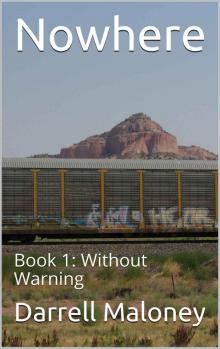 Without Warning
Without Warning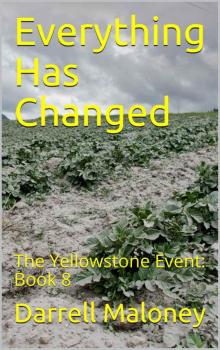 Everything Has Changed
Everything Has Changed Rest in Peace
Rest in Peace This Changes Everything
This Changes Everything The Final Chapter
The Final Chapter It Can't Be Her
It Can't Be Her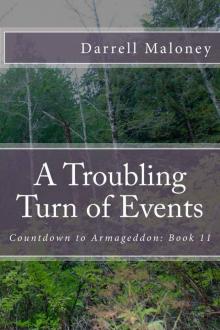 A Troubling Turn of Events
A Troubling Turn of Events The Blockade
The Blockade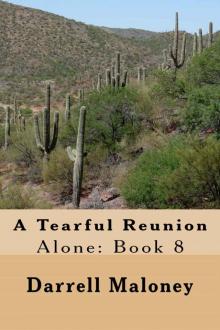 A Tearful Reunion
A Tearful Reunion Countdown to Armageddon
Countdown to Armageddon Alone, Book 3: The Journey
Alone, Book 3: The Journey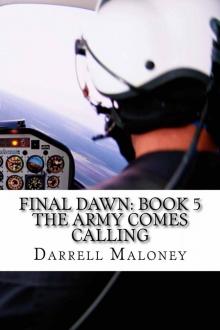 The Army Comes Calling
The Army Comes Calling The Grim Reaper Comes Calling
The Grim Reaper Comes Calling Her Name is Beth: Alone: Book 5
Her Name is Beth: Alone: Book 5 Red: The Adventure Begins
Red: The Adventure Begins Rise From The Ashes: The Rebirth of San Antonio (Countdown to Armageddon Book 3)
Rise From The Ashes: The Rebirth of San Antonio (Countdown to Armageddon Book 3) An Unkind Winter (Alone Book 2)
An Unkind Winter (Alone Book 2) A Stunning Betrayal: Alone: Book 9
A Stunning Betrayal: Alone: Book 9 A Whole New World: Ranger: Book 2
A Whole New World: Ranger: Book 2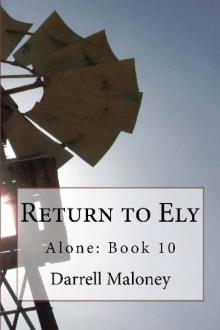 Return To Ely
Return To Ely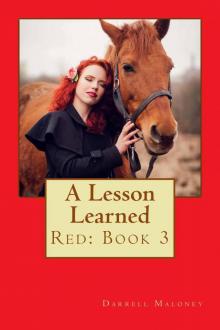 A Lesson Learned: Red: Book 3
A Lesson Learned: Red: Book 3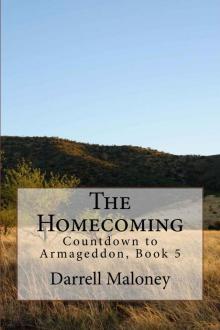 The Homecoming: Countdown to Armageddon: Book 5
The Homecoming: Countdown to Armageddon: Book 5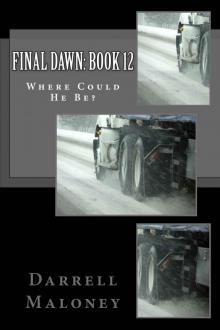 Final Dawn: Book 12: Where Could He Be?
Final Dawn: Book 12: Where Could He Be?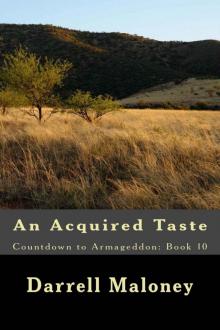 An Acquired Taste
An Acquired Taste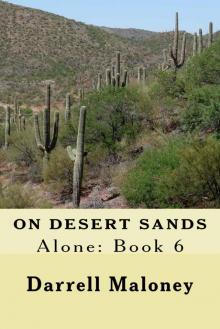 On Desert Sands: Alone: Book 6
On Desert Sands: Alone: Book 6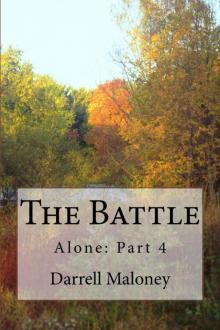 The Battle: Alone: Book 4
The Battle: Alone: Book 4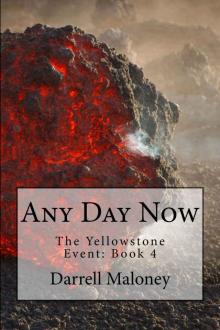 Any Day Now
Any Day Now Too Tough To Tame: Red: Book 2
Too Tough To Tame: Red: Book 2 No Help From Austin: Red: Book 5
No Help From Austin: Red: Book 5 An Unwelcome Homecoming
An Unwelcome Homecoming A New Start: Final Dawn: Book 9 (Volume 9)
A New Start: Final Dawn: Book 9 (Volume 9) A Stunning Betrayal
A Stunning Betrayal An Undeclared War (Countdown to Armageddon Book 4)
An Undeclared War (Countdown to Armageddon Book 4)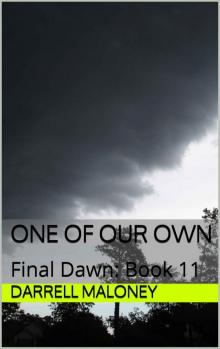 One of Our Own: Final Dawn: Book 11
One of Our Own: Final Dawn: Book 11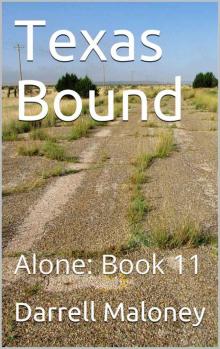 Texas Bound: Alone: Book 11
Texas Bound: Alone: Book 11 Payback: Alone: Book 7
Payback: Alone: Book 7 The Quest: Countdown to Armageddon: Book 6
The Quest: Countdown to Armageddon: Book 6 The Siege
The Siege The Yellowstone Event: Book 1: Fire in the Sky
The Yellowstone Event: Book 1: Fire in the Sky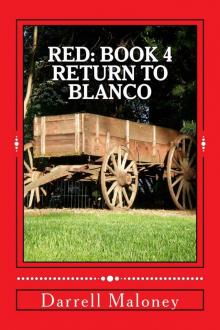 Return to Blanco (Red Book 4)
Return to Blanco (Red Book 4) The Search
The Search AFTER THE DUST SETTLED (Countdown to Armageddon Book 2)
AFTER THE DUST SETTLED (Countdown to Armageddon Book 2)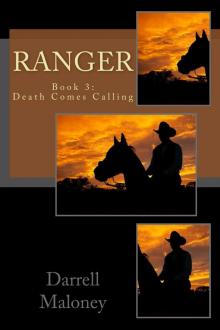 Death Comes Calling (Ranger Book 3)
Death Comes Calling (Ranger Book 3)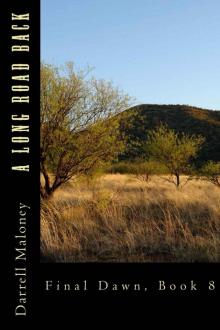 A Long Road Back: Final Dawn: Book 8
A Long Road Back: Final Dawn: Book 8